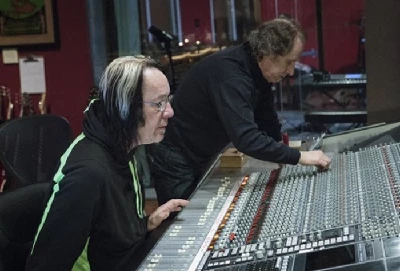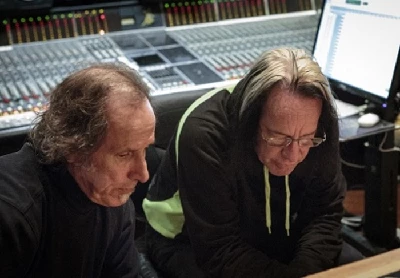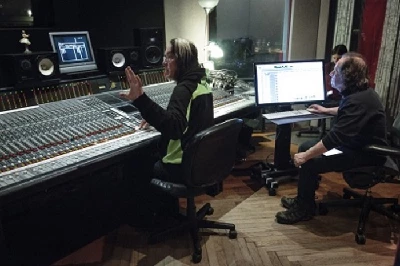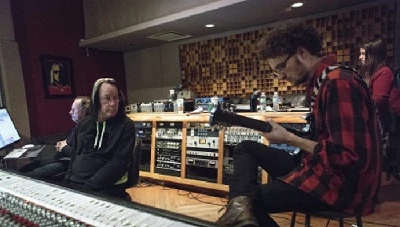published: 29 /
4 /
2013
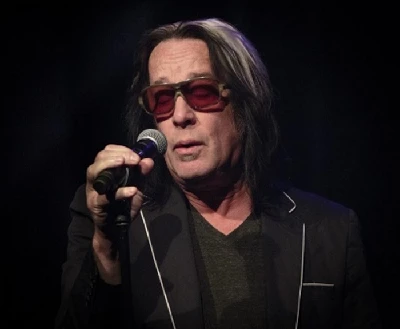
Todd Rundgren recently spent a week at Columbia College in Chicago working with its music students both at a recording session and also on preparing for a show. In the first part of a two part profile Lisa Torem sits in on the recording session...
Article
The lyrics, “I don’t want to work/I just want to bang on a drum all day,” comprise the refrain to one of Todd Rundgren’s most hummable tunes, but the tongue-in-cheek tone belies this songwriter/producer’s unarguable work ethic. There should be a warning label: Don’t think that because Rundgren writes about slackers that he is one.
In fact, Rundgren’s career just as a producer is unparalleled. He has created award winning recordings for the Psychedelic Furs, Grand Funk Railroad and the New York Dolls – there are too many more to mention. His intelligent decisions consistently warrant successful results. Like when he transported the Dolls from New York to his home in Kauai in the Hawaiian Islands in 2009 for ‘Cause I Sez So’ - even though they had to lug many recording toys that Kauai just didn’t have, the final take was worth the schlep and, since Rundgren had produced the glam band’s first recording, he knew how to update the Dolls, even though their line-up had changed – only two of the originals were onboard – and they had suffered many setbacks.
Patti Smith, for whom he produced ‘Wave’, and Jim Steinman, who composed ‘Bat Out of Hell’ for Meatloaf, agree that he’s a genius. But what is it exactly that makes Rundgren such a badass, sought after producer? When Columbia College landed in the throes of his legendary orbit, perhaps they thought they’d crack the code.
Joe Cerqua, Director of Production, Columbia College Music Department, produces 400 concerts per year, plus annual commencements, musicals and open houses. He minces no words when explaining why the school invited Todd Rundgren to participate in their artist-in-residence program.
“Todd Rundgren is the greatest songwriter who has ever lived as far as contemporary and pop music, and Todd has managed to keep his career going for decades. He’s such a chameleon – he can really go from genre to genre. He’s been very successful working in each one, either as a writer, producer or performer.”
“So I just thought it would be great for him to have some time with our students in our contemporary music program, so they could get a look at somebody who had some staying power and who has just been successful pretty much at everything he touches. Besides the pop and other styles of music, he’s also written for TV – so I thought here’s a guy who has managed to find opportunity after opportunity as the decades move on. That’s why I chose him, and, again, he’s one of the greatest songwriters ever to live.”
The obvious question, though, is how all concerned were able to turn what might have been a one-off workshop into seven days of educational activities.
Cerqua elaborates: “I used to do the day workshops – they were still very expensive (to have an artist like Todd, there, for a day) and not so much bang for the buck.
“I’m not only just trying to educate the students; I’m trying to make contacts for them. I’m trying to build relationships between the college and artists, but also build some contacts for the students. So this way when an artist is actually here for a week, by the time Friday rolls around and we’re doing sound checks for these concerts, the artist knows all of these students that he and she has been working with on a first name basis. So if they’re really impressed by somebody, then there’s the possibility for future contact. And lots of times with the artists, they have been impressed with one student or another. “Hey, you can send me stuff…”
“Paula Cole set up an account on Facebook where students could actually send her their music if they wanted to get some input from her, and so that it didn’t just end. So that’s why I don’t even enter into the one-day, “drive by,” I call it, because this thing, which we developed for a week, turned into something great.”
“And the artist, actually, as the week goes by, gets to see what their influence is doing because the difference between the rehearsal they have on day one and the rehearsal they have on day five – sometimes there’s a night and day difference.”
Cerqua, who spent time with Rundgren in the classroom and in the studio, found the rock star’s leadership skills extraordinary. “One of the things that I really loved about the way Todd worked – most of his music is not written down on paper but Todd knows exactly what everyone in the band is supposed to be doing at any given minute in that song and that’s pretty amazing, especially when you consider the man’s body of work.”
“For the concert that we did, some of it was really, really old and some of it was not really, really old, but it didn’t matter what era the tune was from. He knew exactly what he should be doing and was really good and specific about, ‘No, not that, this. No, you’re playing this chord – you’re one note off – this is how I want this chord voiced.’
“…The same thing with the horns – it didn’t matter which instrument it was – the same thing with the strings - it was pretty amazing what that guy’s got going on in his head.”
Although Cerqua expressed that things went smoothly, he pointed out that the partnership had been forged well before the week began.
“Months before the artists arrive, we start having conversations about what they’re going to be doing and what they’re going to be comfortable doing because I don’t want an artist in a situation where they’re supposed to be talking about something that they don’t know anything about because you can’t assume.”
“I wanted to make sure Todd did a certain amount of lecturing and work shopping around songwriting because he’s amazing ,and I think the students really wanted to hear how somebody like that does it.”
“Todd also spent time working with one of our ensembles: The Recording and Performance Ensemble. So he actually spent some time working with them on the song they played at the concert in a writing session, and then he went to the studio for a couple of nights and he helped them make a recording of it. Now most of our artists either do one or the other - they’re either working towards the concerts or working towards the sessions, so it’s great when you get somebody who has got as much energy as Todd does and who says, ‘Yeah, I’ll do both’.”
“Todd and I chose the songs for all of the other bands, but then with the RPE band we said, “This is the upper-level band. Why don’t we let them choose a song that isn’t one of the songs chosen for one of these other bands?” And the song that they chose was a song that he had never ever played live. So that night at the concert was the first time that song had ever been played live, and he didn’t tell anybody that until the rehearsal.”
xxxxxxxxxxxxxxxxxxxxxxx
4 PM Wednesday. Rundgren, casually dressed in slacks and a midnight black hoodie with a lime stripe, which accentuates his tall frame, strolls through the corridor of Rax Trax, the popular Chicago studio sandwiched between signature brick buildings and a city parking lot. Although the business is located on a quiet intersection, it is merely a few blocks away from sushi, stir-fry and the frenetic pulse of the city at large.
Rundgren checks out Rax Trax’s prized vintage gear and massive SSL analogue console, a handsome unit developed in England. Rick Barnes, owner of Rax Trax since 1985 and whose client list includes Billy Corgan, Need to Breathe, Plain White T’s, Ok Go, Rivers Cuomo, the Nicholas Tremulis Band, Alejandro Escovedo, Liquid Soul, Buddy Guy, Koko Taylor and many, many more, has worked with the Recording Performance Ensemble throughout the semester.
As an adjunct faculty member at Columbia College, he teaches a series of music technology classes. Though he and Rundgren have not worked before, they’ll settle into a “mile a minute” schedule for two comprehensive sessions by the week’s end.
“I’ve been really fortunate that music is my life,” Barnes states humbly in regards to his vast experience as an engineer, producer and instructor.
He discusses other artists who have participated in the program. “We’ve had some fabulous guest artists like Charlie Sexton, who is a great artist and producer out of Austin Texas. Charlie, who has toured with Bob Dylan, is a really cool cat to work with, and we’ve had Yoshi Breen, who is a producer from Holland. Yoshi, being a great musician, has a very easy time working with and producing the Columbia College musicians. His production style is both fun and graceful.”
“Columbia College is getting in some very good artists. They’re not just lecturing the students. They’re working hand in hand with them.” Like Joe Cerqua, he understands that the role of the guest artist can be challenging.
“When the guest artists come in they have so many responsibilities throughout the week that they’re shifting from one situation to another and it’s incredibly hard on them, but all three of the guest artists this year did a great job with the student musicians.”
“The students were really gassed on Todd because he is such a celebrity. He had nice ideas for them and he really inspired them. I knew structurally how it was going to go and I knew he was technically savvy because he’s done a lot of engineering and producing in the past, so I knew he wasn’t a producer who wasn’t hands on.”
“People have their own ways of working. I always appreciated Todd’s genius. He’s a fantastic songwriter. What I respected about his work in the past was his freshness and uniqueness as a songwriter.”
Although Barnes records music from various eras, he doesn’t feel the same way about each one. “Back in the 80s was a black hole for me,” he explains. “Corporatized music was really getting popular. It was really very plastic sounding music. Lots of hair do bands were running around back then. It was very commercial and very programmable stuff. Rundgren was like a breath of fresh air.”
Barnes has enjoyed working with emerging artists, as well, during his long career. “Our niche is to help the up and coming bands and to help them jump to a new level. When you work on the street level like that, it allows you to keep an eye on the new talent coming out of Chicago. It helps us keep a fresh perspective on what’s going on musically. We work with lots of musicians coming out of schools like Columbia and De Paul.”
“There’s also a great talent pool coming out of the many Chicago Gospel churches. I’ve seen some truly great players coming from the South Side church scene. So it’s been a very nice niche for me and the studio. Instead, of slugging it out with record labels and their “expertise”, we’re working on a grass roots level where there’s lots of excitement still. There’s less money by doing this, but much more personal gratification.”
xxxxxxxxxx
When Columbia College asked Rundgren to be their artist-in-residence, they probably expected a flurry of activity, but it’s hard to say exactly what clinched the deal because the native Philadelphian, now residing on the lush island of Kauai, could have been blending Mai Tais with his wife Michele from a surfboard-shaped table at their Tiki Iniki Tiki bar instead of braving Chicago’s bone-chilling climate for seven days.
Rundgren is no stranger to the college circuit, but when he does get involved he does it in a big way. He lectured at DePauw University, Indiana in 2009 and the following year co-taught a course at Indiana University, ‘The Ballad of Todd Rundgren’. He also appeared at Northwestern before his stint at Columbia, but being professor for a week is a serious time commitment, which can entail designing and teaching academically approved coursework, not to mention in this case being accountable for a student-centered performance. It’s a far cry from the merch table, record company politics and frenetic touring for which Rundgren has normally been associated. Besides being top notch in your field, you must also communicate effectively with younger people. Although Columbia prides itself on bringing the real world into the classroom, would this rock star feel like he was under a microscope in a foreign fishbowl?
Rundgren had already presented a few onsite workshops, but this afternoon would be more personal. Way back in the 1970s he sang ‘The Verb to Love’ with Utopia. So prophetic! If he were morphed into a part of speech, that’s the one. Conjugate Rundgren and expect kinesthetics. In the studio, eyes dart, fingers tap and boots shuffle to an internal beat, yet once he has internalised a plan, nothing else distracts him. He settles into his new nest for the next five hours. Tonight’s task? Make a recording of an original song, written by student vocalist, McKenna Shelly, performed by Shelly and other Upsin Hounds band members, Emily Nichols, Catherine Poulos, Chris Kaczmarek, Aaron Tanning and Ben Dacoba.
When not recording tracks, band mates sporting T-shirts or red and black checked flannel congregated on a custom leather sofa, their youthful charm conveyed through random conversations; on a recent trip to Germany, they were impressed that you could buy beer out of a vending machine.
Rundgren countered, “Can you imagine vending machines with beer in the US?” He joked that American teens would be carrying off not just the beer, but the actual machines with their pickup trucks.
On the surface the scenario was casual, yet as Barnes and Rundgren whipped around the enclosed space in swivel chairs they made quick, efficient decisions. John Ashton of the Psychedelic Furs once said in an interview about Rundgren, “He taught us a lot about tightening up our rhythm. He showed us how to push a beat and pull it back.”
That take-charge attitude was demonstrated early on, but Rundgren also encouraged a great deal of feedback from Barnes and the students. Example: “So you had some ideas for some other interjections? Where in the song do you think -- maybe over the verse?” Incorporating the Socratic technique in the studio certainly got the juices flowing.
Rundgren has left no genre unturned in his long-standing career. Cruise the Internet to find him reimagining R & B covers like ‘Cool Jerk’ in nontraditional meters or wailing inspirational ballads like ‘Love is the Answer’ in his multi-octave, gospel voice. He can channel that son of a Pentecostal vibe onstage in a heartbeat and come across as a street-smart city kid in the flesh.
But though he has explored distinct phases of prog rock, pop, R & B and jazz-inflected tonalities throughout his career, there’s an industrial-strength thread that binds the decades together, creating a singular colour-outside the lines oeuvre. A less confident artist might have suffered an identity crisis somewhere along the way – a less intrepid artist might have felt buried underground by a culture that encourages pretentious branding. But Rundgren’s wealth of experience has opened him up to so many ideas, he naturally blurs genre boundaries.
At 18, he left home and began his musical career with blues-oriented Woody’s Truck Stop. Since the early days of pop classics like ‘Hello, It’s Me’ to enigmatic ‘Change the World’ or his recent dub step influenced CD ‘State’, on which he explores a myriad of emotions and industrial sounds, he has decried formulaic music, whilst holding dear the classics, which informed his earlier career.
He may have drawn inspiration from these songwriters: Gamble and Huff, Hall and Oates and Gilbert and Sullivan, but he’s not had the luxury of a writing partner - even though muse Laura Nyro might have been a contender at one time - so maybe that independent streak has compelled him to work harder, faster and edgier? Maybe being a lone star; not being McCartney’s Lennon or Elton John’s Taupin made him fight for each soaring melody and earnest phrase that earmarked his style. Or maybe ‘Change Myself’ is not just an arbitrary song title, but his de facto philosophy.
As a solo performer, he’s a quadruple threat: singer/songwriter/instrumentalist and producer. He makes “good” sound “great” - on time and on budget. Yet, to stay so valued, you have to channel a little Sherlock Holmes. You’ve got to love not just solving the problem, but the intrinsic art of the mystery. Nobody knows what will come of tonight’s marathon – therein lays the magic - but these college kids seem psyched about the challenge.
Rundgren and Barnes isolated sounds by first working with drummer, Dacoba.
“Let’s hear the snare drum,” says Todd. “Are we listening to the two mics at once?” he asks Barnes. They’re hunched over an enormous sea of control knobs.
“Put the bottom in it,” says Todd. Rick counters, “The bottom snare’s got a good high level for me.” “Alrighty,” says Rundgren. “Let’s do the high tom. Move that gel a little closer to the centre of the head. It’s still ringing. That sounds better. Let’s hear the floor tom.” The two discuss the upper mid range.
“A little more bottom? Let’s make sure the potential is there” – and then, “Let’s hear the high hat, please.” Dacoba exerts control even when Rundgren says, “Hit it as hard as you’re going to hit it!”
Dacoba is then advised: “Play around the kit. We just want to see if anything sticks out.”
It’s time for the playback. “Sit in the driver’s seat,” says Rundgren, motioning for the drummer to join them in the listening room.
Renaissance painters had their own lexicon for light and shade and balance and this crew is no different. Rundgren moves on to the rest of the players. He’s looking to get a “more spacious sound in the headphones.”
He asks Kaczmarek and Tanning to “play for a while and get comfortable with their gear.” “Emily, let’s hear you a little bit,” pipes Barnes. She plays a rhythmic chord progression on the keys. Then singer Shelly sweeps her silky black hair away from her face and sways to the beat. She faces the rest of the band from across the Plexiglas window.
After Tanning was invited into the control room to “futz around,” he admitted that he felt something was missing from his track. Rundgren respected the young guitarist’s vision yet never turned a moment into a game of show and tell. Instead he asked Tanning what he had in mind. The guitarist explored his instrument more aggressively, playing some sophisticated changes over the original version, finally letting himself go on an intense sonic intermezzo.
Communing face-to-face rather than through the window worked like a charm. With energy so infectious, the random discourse on the couch got blindsided by an awestruck silence. ”Print it,” barked Rundgren. “You got it,” said Barnes, smiling, whilst swerving the controls.
After a few hours, the food arrived and the hungry band members evacuated. When Rundgren followed, he randomly reached for a solitary piece, ‘Anything But the ‘Shrooms’, and waltzed purposely back to the studio. I guess the guy lives on air.
After the miniscule break, the singers are up. ‘Rain Fall Blue’ is their canvas. After a trial run, the producer says, “Would you like to do another track or come in and listen to this one first?” Section by section, he points out sharp notes or phrases that need more compression. Rundgren seems to be an expert at timing and precision. “Do you want to take it from where the guitar comes in or from the top?” he asks, mindful of hectic scheduling and vocal fatigue.
The song takes on new energy as imperfections and bright spots are tweaked or printed. A rapper drops by to recite a sultry verse over some rhapsodic harmonies; excitement escalates. Rundgren asks him if he’s satisfied or wants one more.
The photographs that accompany this article were taken by Paul Crisanti, PhotoGetGo
Band Links:-
http://www.tr-i.com/
http://en.wikipedia.org/wiki/Todd_Rund
https://www.facebook.com/toddrundgren
https://twitter.com/toddrundgren
Picture Gallery:-
